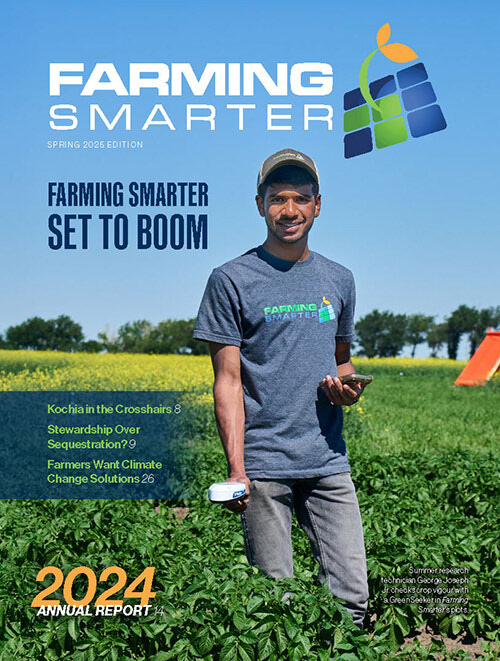by Ryan Mercer, Farming Smarter President
This is a good year to talk about making your farm resilient and the role Farming Smarter can play in helping you make that happen! The good ol' Oxford Dictionary defines resilient as "able to withstand or recover quickly from difficult conditions."
Farming Smarter exists to drive agriculture innovation at the farm level. We know that innovation is hard and about long-term results. That's why we feel privileged to be able to say that innovation drives us, not profit.
This allows us to study practices such as implementing cover crops on the prairies without the risk a farm incurs by experimenting with new ideas. Our Cover Crops Across Prairie Canada project led by Yvonne Lawley of University of Manitoba has some stories to tell and information to share.
After the spring 2021 drought, the idea of winter cover crops in a rotation could stand out as an idea worth considering. Winter cereals and pulses planted in the fall of 2020 did better than most of the spring planted crops. Farms with fall planted crops were probably more resilient this year.
The winter of blowing soil we had last year certainly makes a good argument for reduced tillage practices. But reduced tillage sometimes means too much spring crop residue in fields. Proper residue management presents a challenge as it can lead to cold and wet seedbed conditions and improper seed to soil contact during seeding.
Farming Smarter took on a project working with a strip tiller to compare it to zero-tillage and conventional tillage practices. We're watching its effect on crop emergence and seed yield of conventionally sown and precision-planted canola on dryland and irrigated farming systems. We hope that the strip tilled row will provide better seed to soil contact and a warmer protected seedling bed. The Strip Tillage and Precision Planting for Canola project still has another season before final results.
Farming Smarter started precision planter projects some years back now. They aren't really new technology anymore, but we're experimenting with all the ways these planters might improve southern Alberta farms. Precision planters clearly offer some benefits to crops, but any piece of new technology bought for the farm must pay its way in versatility and usefulness. We've planted corn, pulses, cereals and hemp now with the planter. You can read about these projects on our website.
Our website, by the way, is just the tip of the iceberg when it comes to all the ways we share our research results with you. We can be just as innovative in our communication with you as we are in our fields. Take advantage of this and all the ways we work for you. It will improve your farm survival prospects, because that's what we're here to do ≥ we change the way people farm.



